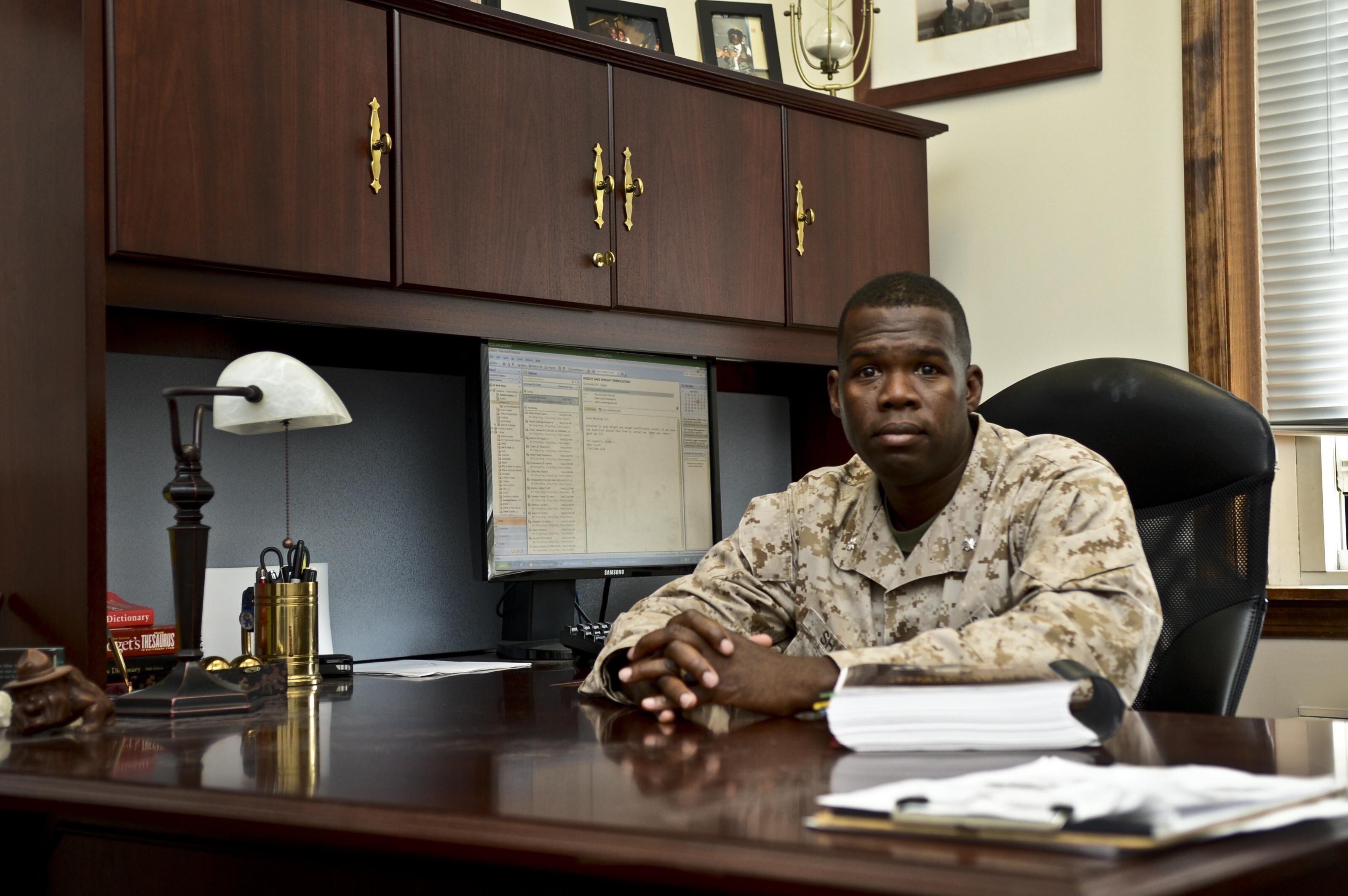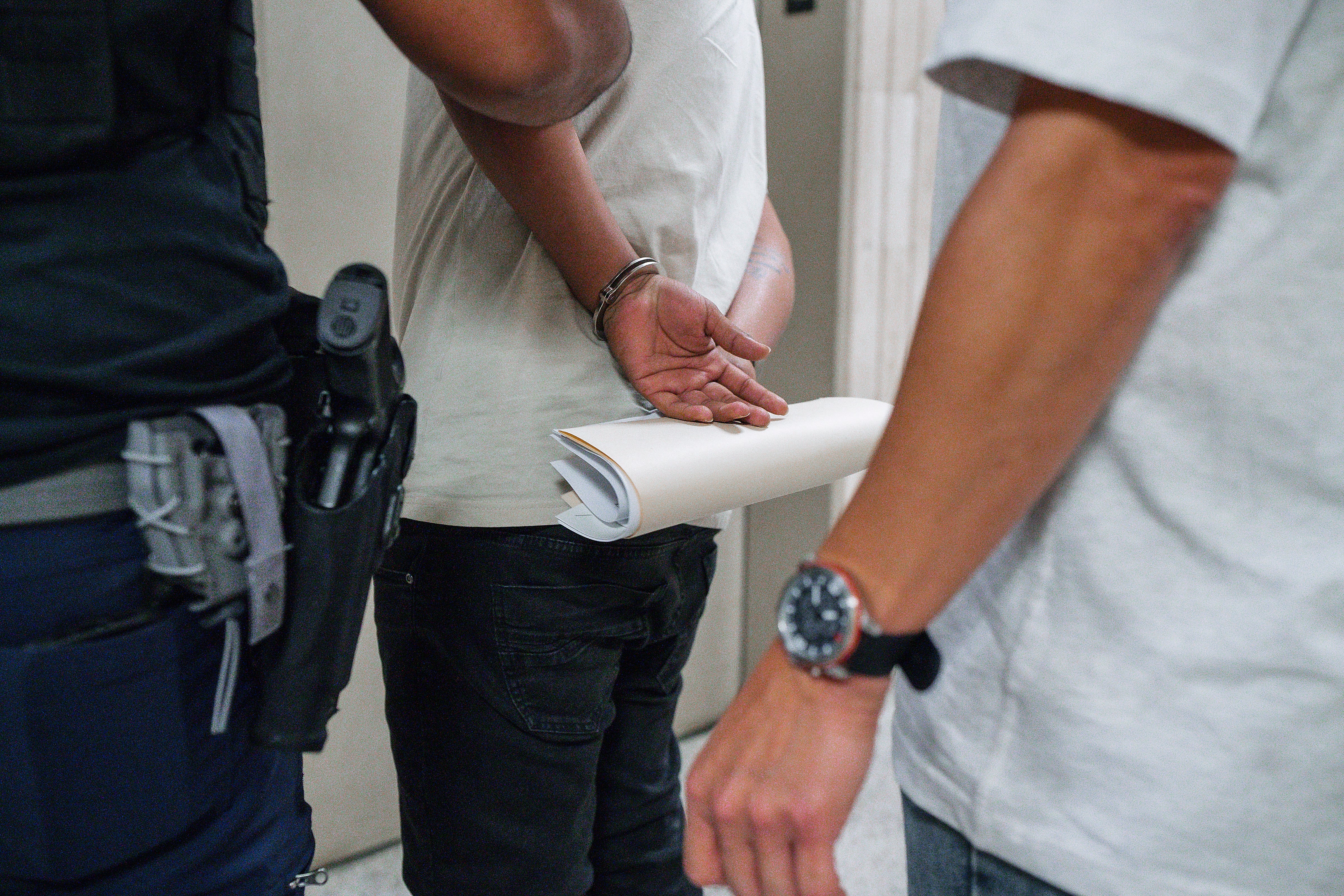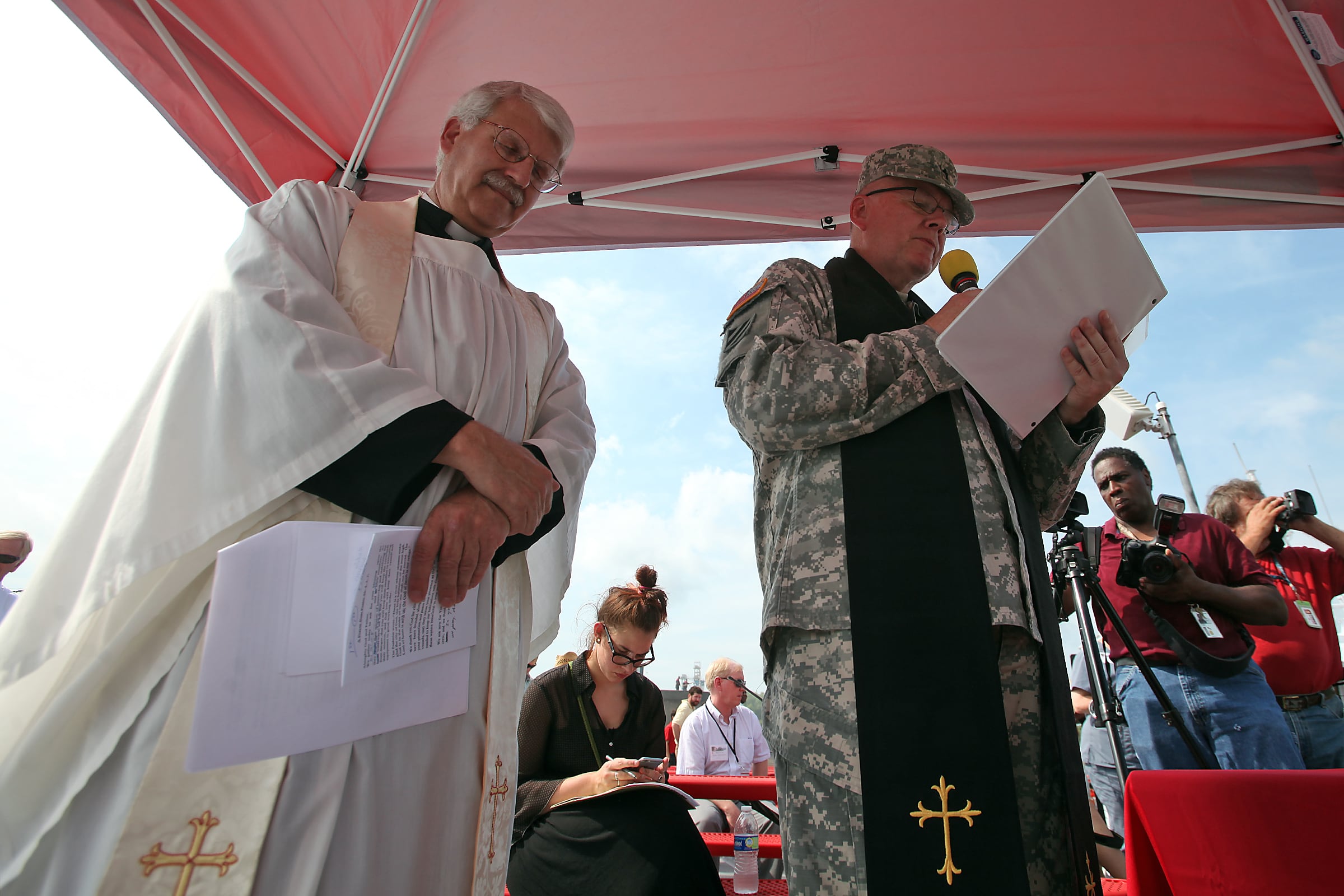Two Marine Raiders and a Raider Navy corpsman have challenged whether they’ll get a fair trial on manslaughter charges after one of the Corps’ top lawyers made what some called “threatening” statements to one of their attorneys.
Gunnery Sgts. Joshua Negron and Daniel Draher and Chief Petty Officer Eric Gilmet face voluntary manslaughter, negligent homicide and other charges related to the Jan. 1, 2019, death of Army Green Beret veteran and contractor Rick Anthony Rodriguez following a brief fight outside a bar in Erbil, Iraq.
The three men faced trials as recently as January, but those were delayed after an anonymous complaint to the inspector general of the Marine Corps mid-November 2021 triggered allegations of unlawful command influence on the part of Marine senior attorney, Col. Christopher B. Shaw.
In the Negron and Draher case, which is being tried separately from Gilmet, Judge Lt. Col. E. A. Catto ruled on Monday that defense attorneys had “satisfied the low burden of presenting ‘some evidence’ that could constitute unlawful command influence” if proven true.
Now the prosecution must respond with sufficient evidence for the judge to rule that unlawful command influence was not committed.
As of press time Wednesday, a ruling had not yet been made in the Gilmet case as to whether unlawful command influence allegations would move forward.
Any next steps in their cases await the ruling of the military judge to determine if charges should be dismissed or other moves made to ensure a fair trial.
RELATED

Command investigation
Shaw, who has served as a Marine lawyer since 2004, was a deputy director of the Judge Advocate Division of the Marine Corps when he traveled to Camp Lejeune, North Carolina, for scheduled talks Nov. 15-19, 2021.
While the deputy director position does not officially select Marine attorneys for assignments and career progression, input from that office is considered by the job field’s monitor, according to Marine attorney statements made in court filings and a subsequent command investigation of Shaw, obtained by Marine Corps Times.
At one of those briefings, he spoke with Marine defense counsel assigned to bases in the area. Marine attorney Capt. Matthew Thomas, who was representing Gilmet, asked Shaw in the open forum about protection for defense attorneys.
“What is being done to protect the attorney in that position from outside influences such as political pressures, media pressure and general societal pressure?” Thomas asked, according to Marine Corps documents.
“I know your name and I know what cases you’re on and you are not protected,” Shaw told Thomas, according to at least four sworn affidavits contained within court documents. “You are shielded but not protected.”
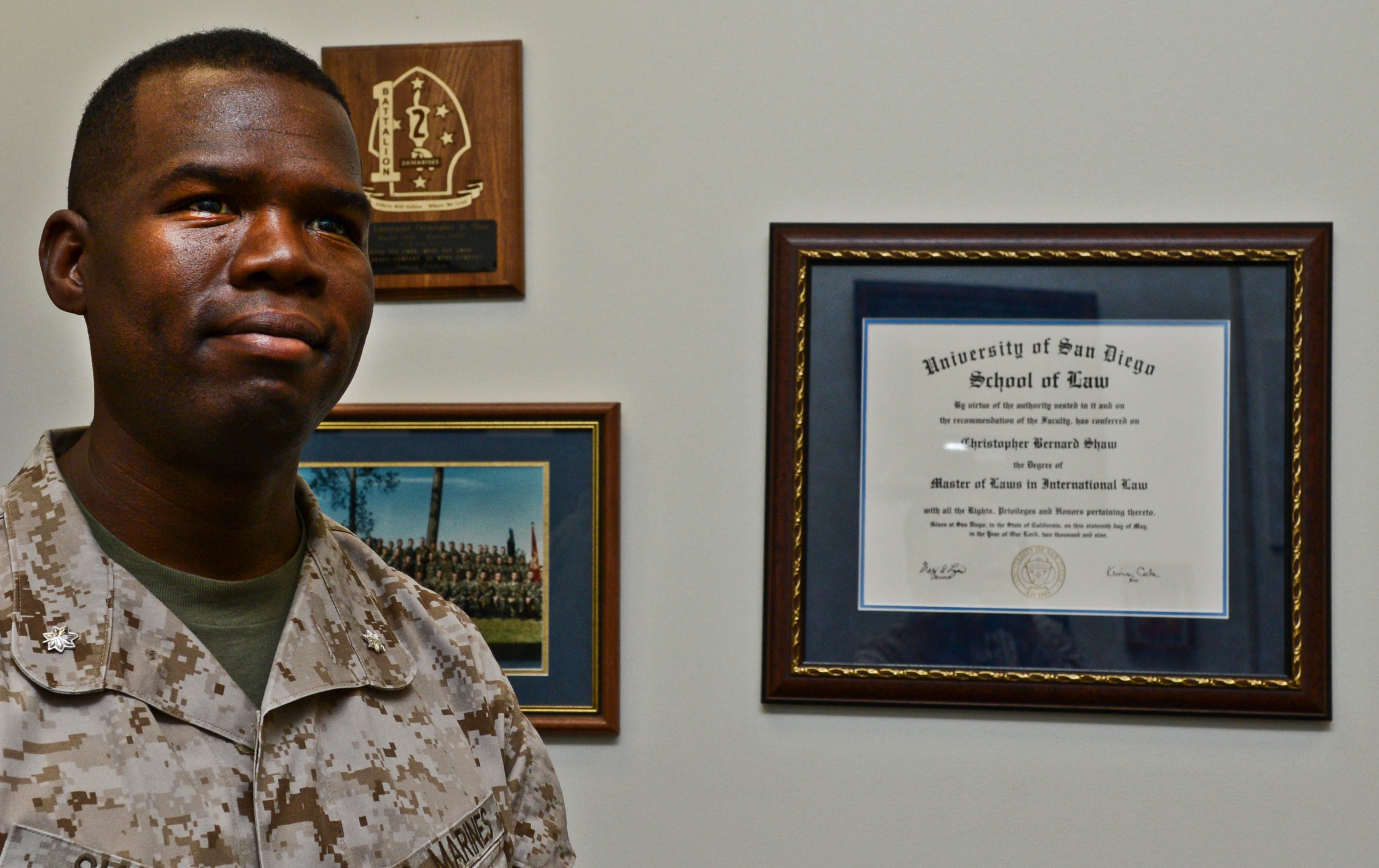
Following the meeting, the complaint to the IG kicked off a command investigation, the initial phase of which was concluded on Dec. 30, 2021, according to documents.
The investigation was conducted by Col. Peter D. Houtz, a judge on the Navy-Marine Corps Court of Criminal Appeals, into whether Shaw had committed Uniform Code of Military Justice offenses, to include Article 92, violating an order, and Article 131g, wrongful interference with an adverse administrative hearing.
Houtz determined that Shaw’s comments to Thomas and other reported comments from that and other meetings did not rise to the level of a chargeable offense.
“Col. Shaw’s comments were unprofessional but did not constitute a violation,” Houtz wrote. “There is no evidence that he knowingly, recklessly or intentionally or otherwise wrongfully intended to cause the ‘harm’ required.”
A ‘chilling effect’
In two statements that Shaw provided before exercising his right to remain silent, the colonel called his comments about defense attorneys not being protected as or an example for the attorneys to note as he talked about the issue of outside pressure on high-profile cases.
“Nevertheless, I do not believe anything I recall saying during my talks with (defense counsel) during the dates alleges were negative or degrading to their practice, their cases, or their career advancements,” Shaw wrote in a Dec. 13, 2021, statement.
He also claimed, in his first statement, that he didn’t know Capt. Matthew Thomas.
However, text messages provided to the military judge reviewing whether Shaw’s conduct constitutes unlawful command influence show another side.
On Thursday, Nov. 18, 2021, at 8:40 a.m., before the briefing with Thomas and other defense attorneys, Shaw texted Maj. Benjamin Broadmeadow, Marine legal community manager and policy analyst:
Shaw: “What was Thomas slated for?”
Broadmeadow: “Capt. Matthew Thomas sir?
Shaw: “Yes”
Broadmeadow: “He doesn’t know yet, but he’s one of our (Expeditionary Warfare School) selectees.”
Shaw: “He will want to decline and extend at (Camp Lejeune).”
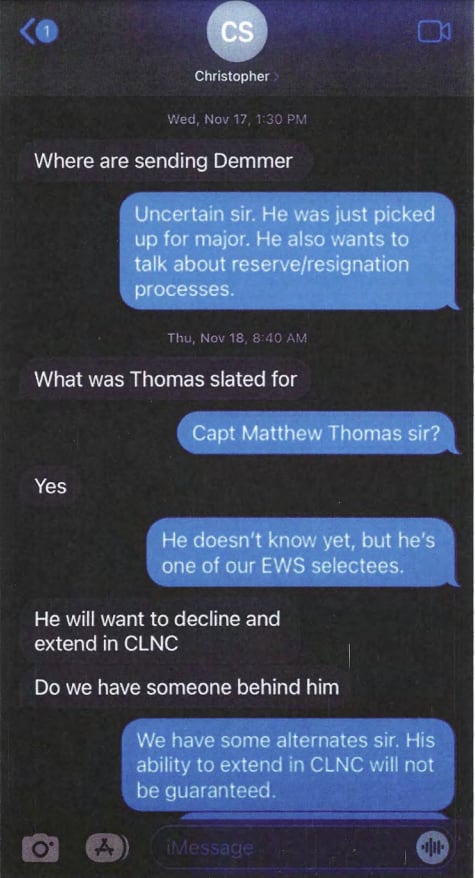
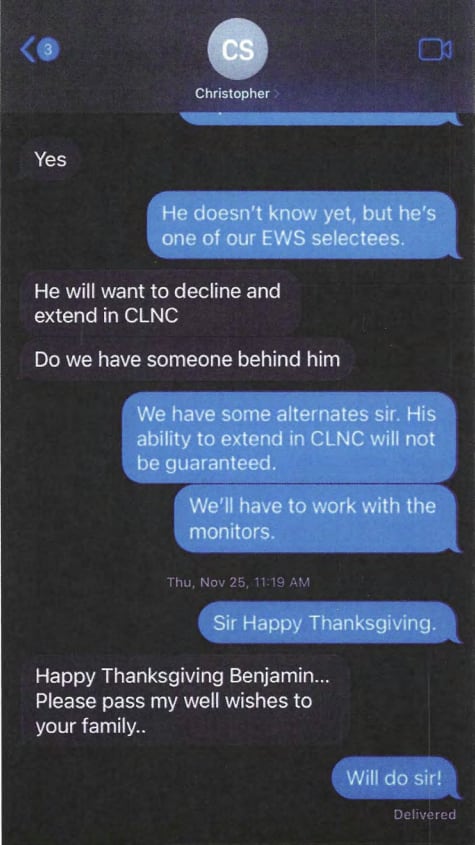
Maj. James Stenger, Marine Corps spokesman, told Marine Corps Times in an email that out of respect for the legal process, the current investigation and Shaw’s privacy rights, the Corps would not comment on the case nor provide Shaw for an interview.
Stenger did confirm that Shaw had been assigned to the Judge Advocate Division on July 29, 2021, and was then assigned to duties at Marine Corps Manpower and Reserve Affairs on Nov. 19, 2021, which was the day the IG complaint was filed.
The alleged briefings took place from Nov. 15 to Nov. 19, 2021.
Stenger added that though the investigating officer had completed his portion of the investigation, those findings are awaiting an endorsement by the convening authority, which means that it can open an active investigation until the investigation is endorsed in writing.
But Shaw’s statements were enough to produce a “chilling effect” on his then-military defense counsel and potentially on other Marine defense attorneys who might be assigned to represent any of the three co-defendants.
At least that’s what attorneys for Gilmet, Draher and Negron have since argued and a military judge is weighing, as of the most recent hearing on Jan. 20.
“It’s one of the biggest whitewashes I have ever seen,” said Colby Vokey, Gilmet’s civilian attorney.
Vokey is a retired Marine lieutenant colonel who served as a military lawyer for much of his career.
He’s arguing in court that charges against his client should be dismissed because Shaw’s statement show that his client can’t get a fair trial.
Attorneys for Draher and Negron have filed motions arguing charges be dismissed against their clients on the same grounds.
That’s because, Vokey told Marine Corps Times, military attorneys defending his client now know that top Marine lawyers are watching such cases closely and may hold it against military defenders, endangering the defense attorneys’ career prospects.
Gilmet’s former military attorney, Thomas, and his military co-counsel have since been removed from the case. Gilmet has told court officials in sworn statements that he doesn’t believe he can get a fair trial.
Recently, senior leaders over defense attorneys at Camp Lejeune, North Carolina, have reached out to Navy and Air Force attorneys to represent Gilmet.
Multiple military defense attorneys present at the Shaw briefing filed sworn statements that they heard the exchange between Shaw and Thomas and they perceived what Shaw said as a threat.
In his affidavit, Marine Maj. Kurt Sorenson also listed other alleged comments that Shaw made about other ongoing investigations involving current military attorneys and sharing a story of the beating of a homosexual Marine that happened when Shaw previously commanded a unit prior to becoming a military attorney.
At a separate brief, Shaw allegedly singled out an ongoing investigation of Marine attorney Maj. Benjamin Grodi, according to at least five sworn affidavits.
Court documents show allegations in that separate investigation that Grodi gave “demeaning nicknames to several subordinate staff,” “makes inappropriate comments regarding sexual activity” and “assigned two female officers to a case involving sexual misconduct” because he thought it would “be funny to watch in court,” among other allegations.
“Major Grodi’s behavior was absolutely unacceptable, it was” f*cking nonsense, Shaw said, according to investigation documents. “I bet-no, I know Maj. Grodi had been doing stuff like that a long time before he got caught.”
It was then that a colonel told Shaw what he was saying was inappropriate and that Grodi was in the room.
Grodi provided his own statement to the investigator in which he said that after the briefing Shaw apologized to him, saying what he had said was unprofessional.
Sorenson acknowledges that certain pressures on military defense attorneys from outside forces and even within the service do happen.
And, the major wrote, when those do happen he handles them for his subordinates.
“But what Colonel Shaw did was threaten my counsel in a manner and at such a forum in which I literally cannot protect them,” Sorenson wrote.
The major, who oversees defense attorneys at Camp Lejeune, North Carolina, said in his statement that he was “still coming to grips” with the impact of Shaw’s comments and how or even if he can “neutralize” the colonel’s threats.
“This will be a leadership issue and challenge within (Defense Services Office) for years to come, regardless of the outcome of any litigation,” Sorenson wrote.
*Note: The article has been updated to include more detailed attribution of the source of text messages provided in court documents.
Todd South has written about crime, courts, government and the military for multiple publications since 2004 and was named a 2014 Pulitzer finalist for a co-written project on witness intimidation. Todd is a Marine veteran of the Iraq War.
